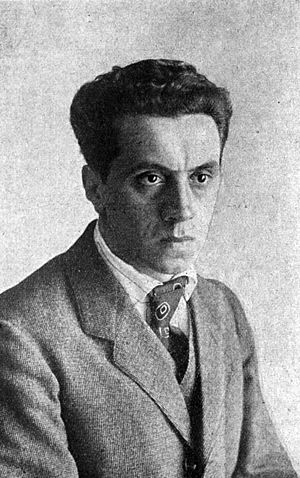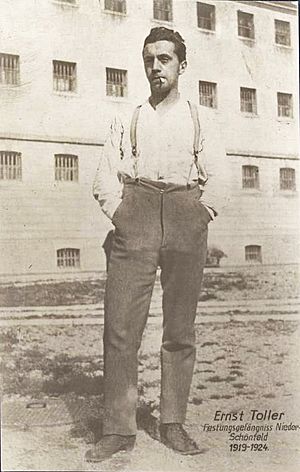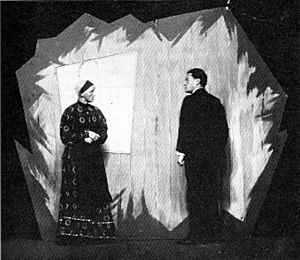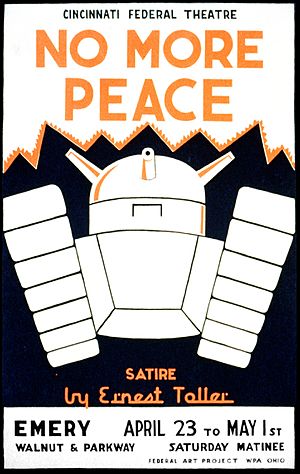Ernst Toller facts for kids
Ernst Toller (born December 1, 1893 – died May 22, 1939) was a German writer, playwright, and politician. He was known for his unique style of plays called Expressionism. In 1919, he was the leader of the short-lived Bavarian Soviet Republic for six days.
After this, he was put in prison for five years. While in prison, Toller wrote several plays that became famous around the world. His plays were shown in big cities like London, New York City, and Berlin. In 1933, he had to leave Germany because the Nazis came to power. He later moved to the United States.
Contents
Ernst Toller's Early Life
Ernst Toller was born in 1893 in a Jewish family in Samotschin, Germany. This place is now called Szamocin and is in Poland. His parents, Ida and Max Toller, ran a general store. His father was also a pharmacist.
When World War I started, Toller joined the German Army. He served on the Western Front for 13 months. After this, he became very ill and could no longer fight. His experiences from the war inspired his first play, Transformation (Die Wandlung), which he wrote in 1919.
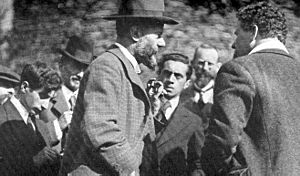
A Brief Time in Power
In 1919, Toller became involved in the Bavarian Soviet Republic. This was a very short-lived government in Bavaria, a region in Germany. He worked with other important figures, including some anarchists and members of his own political party.
Toller served as president of this republic from April 6 to April 12. During his time as leader, he made several new rules. He made the press public and changed the mining industry. He also made the eight-hour workday a legal rule. He tried to control how much money people could take from banks each day. This was to stop rich people from taking money out of the country.
However, his government faced many challenges. Some of his chosen officials were not very good at their jobs. On April 13, 1919, another group, the Communist Party of Germany, took control. In May 1919, the republic was defeated by a group called the Freikorps.
Life in Prison
After the Bavarian Soviet Republic was defeated, Ernst Toller was put on trial. Famous writers like Max Weber and Thomas Mann spoke in his defense. Despite this, he was sentenced to five years in prison. He spent his time in different prisons.
From February 1920 until his release, he was held in the Niederschönenfeld fortress. While there, he spent many days alone in his cell. He also went on a hunger strike for a period of time.
Toller was released from prison in July 1925. After his release, his plays, which he had written in prison, could finally be performed. One of his most famous plays from this time was Hoppla, We're Alive! (Hoppla, wir Leben!). This play is about a revolutionary who leaves a mental hospital and finds that his old friends have changed.
Exile and Later Works
In the 1930s, two of Toller's early plays were shown in New York City. He even attended the opening night of The Machine Wreckers in 1937. Another play, No More Peace, was produced in 1938.
However, these plays were not as popular as they had been before. Their style felt old-fashioned in New York. This made Toller feel discouraged.
W. H. Auden wrote a poem called "In Memory of Ernst Toller" in 1940. This poem was published in a book called Another Time.
Ernst Toller's Works
Here are some of Ernst Toller's most well-known plays and books:
- Transfiguration (Die Wandlung) (1919)
- Masses Man (Masse Mensch) (1921)
- The Machine Wreckers (Die Maschinenstürmer) (1922)
- Hinkemann (1923) – also known as The Red Laugh or Bloody Laughter
- Hoppla, We're Alive! (Hoppla, wir leben!) (1927)
- Feuer aus den Kesseln (1930)
- Mary Baker Eddy (1930) – a play written with Hermann Kesten
After he left Germany, he wrote:
- Eine Jugend in Deutschland (A Youth in Germany) (1933) – his life story
- I Was a German: The Autobiography of a Revolutionary (1934)
- Nie Wieder Friede! (No More Peace) (1935) – first published in English
- Briefe aus dem Gefängnis (1935) (Letters from Prison)
- Letters from Prison: Including Poems and a New Version of 'The Swallow Book' (1936)
In 2000, some of Toller's plays were translated into English. His works are now available for everyone to read and perform.
Toller's Influence
Ernst Toller's work has inspired many other artists and writers:
- The English playwright Torben Betts created a play called Broken in 2011, which was based on Toller's Hinkemann.
- Toller was a main character in the novel All That I Am by Anna Funder.
- The 2017 film First Reformed by Paul Schrader features a character named after Toller.
- A poem by the Hungarian poet Miklos Radnoti was published in 1939, shortly after Toller's death.
- Toller is a play by Tankred Dorst. It explores the political situation in Germany through Toller's story.
- Rotmord is a film about Toller and the Munich Soviet Republic. It won awards in 1969 and 1970.
See also
 In Spanish: Ernst Toller para niños
In Spanish: Ernst Toller para niños
 | Laphonza Butler |
 | Daisy Bates |
 | Elizabeth Piper Ensley |


